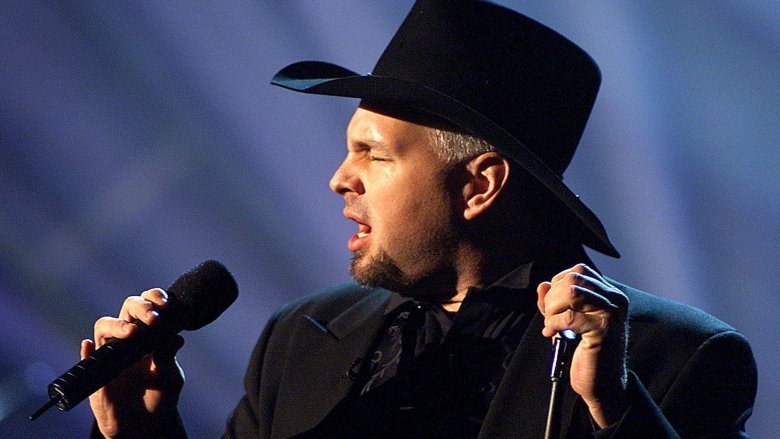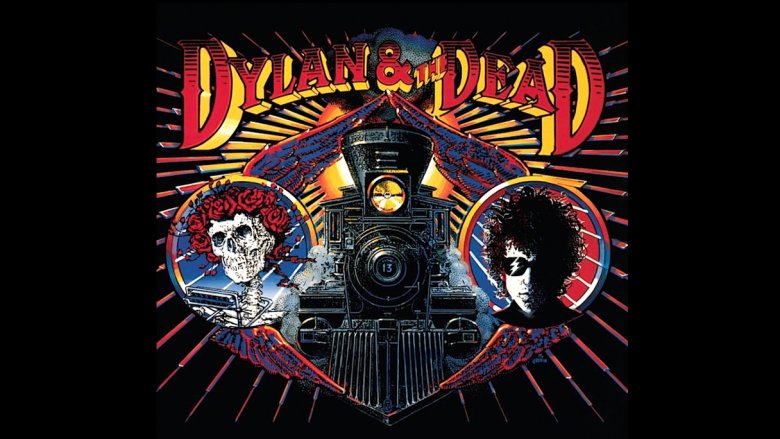Terrible Albums That Have Only One Great Song
Every music act has released at least one lousy record. Nobody — not even the Beatles or the Rolling Stones — hits it out of the park every time. Well, maybe Adele, but she's a relative newcomer. Give her time and she's sure to put out a stinker or two. Every fan of musicians with a history longer than, say, five years — every fan of Metallica, Bob Dylan, Journey, David Bowie, and many more — has at least one record he or she can point to and say, "That's not very good." Our heroes are only human, after all.
Worse, there are those who make a record that stinks ... except just one song. That song is great — you want to hear it and only it, and certainly not the dreck that fills the rest of the record. It used to be you had to buy the entire terrible album just to get that one song, but iTunes, MP3s, and streaming services like Spotify make such purchases a relic of the past. Still, those albums exist out there in the ether, and they're worth pointing out, if only to draw attention to the diamonds in the midst of the coal. Here are a few terrible albums you should be aware of.
Metallica - St. Anger (2003)
Released in 2003, Metallica's St. Anger had become known as the record that nearly broke up the most popular metal band in the world and, after listening to the album, many wished it had succeeded. A post-rehab James Hetfield sounded strained and off-key in many places, and there were no — count 'em, zero — Kirk Hammett solos on the record. The production was muddy — particularly the drum sound (Lars Ulrich, according to Pitchfork, "had taken the return to 'real Metal' quite literally, playing a drum set consisting of steel drums, aluminum toms, programmed double kicks, and a broken church bell"). PopMatters accused producer Bob Rock of "designing the album to sound like five-year-olds just learning to play on coffee cans and Fisher-Price musical equipment." The AV Club summed up St. Anger a little more succinctly (not to mention more politely): "a messy, unsatisfying misfire."
There's an exception, and it's called "Some Kind of Monster." It's got a heavier-than-heavy riff, and it's murky, but then again, so was Black Sabbath. In fact, until Hetfield steps up to the mic, you might think you're hearing an outtake from Paranoid or Master of Reality — it's so dark, it's a little scary. Hetfield recites a litany of body parts that are either turning on themselves or an aggressor, with power and rage. And yes, the drums are a problem. They're less a timekeeping mechanism than a disparate set of rhythms, but the power of the riff and the voice overcomes the weak foundation.
Van Halen - Van Halen III (1998)
Depending on whom one believes, Sammy Hagar either walked away from Van Halen in 1996 or was jettisoned from the band. After a brief dalliance with David Lee Roth, Eddie and Alex Van Halen (along with Michael Anthony, hanging on to his gig for dear life) brought in ex-Extreme singer Gary Cherone to front the third lineup of the band, on 1998's imaginatively named Van Halen III. The results were dismal, at best. According to the fourth edition of the Rolling Stone Album Guide, Cherone shows off "even less personality than Hagar, though he can't really be blamed for the lifelessness of the music on Van Halen III; he's just hired pipes." Much critical derision rained down on Eddie, for his lead vocal on the album-closing "How Many Say I?" which Entertainment Weekly called "a ballad so unintentionally hilarious as to nearly eclipse the glow left by the preceding songs." The public stayed away in droves.
The one song on the record that had life, on which everyone sounded like they were engaged and firing on all cylinders, was the lead single, "Without You." Yes, Cherone shouts like he's trying to out-Sammy Sammy Hagar, but it works here when coupled with Alex Van Halen's mountain-moving drum work and all the little details (a scratchy pick slide here, a syncopated riff there) that Brother Eddie adds. For about six minutes, it sounded like this iteration of the band might just work, and work well.
Liz Phair - Liz Phair (2003)
Liz Phair's 1993 album Exile in Guyville received the kind of critical praise reserved for Beatles records or Velvet Underground re-issues (or, in Rolling Stone, anything Mick Jagger touches). It wasn't viewed as simply an album full of rock 'n' roll songs; it was a feminist treatise, not to mention a thumb in the eye of male hegemony in popular culture. Or something like that. Phair spent the next decade routinely disappointing those critics with indie records that never quite matched the import of Exile. Then, in 2003, she went full-on sellout, working with hit producers and outside songwriters in an attempt to blast into the mainstream with her self-titled fourth record, which Pitchfork, in a rare zero-rating review, called "an album that could have just as easily been made by anybody else" and "hyper-commercialized teen-pop," and of which AllMusic's Stephen Thomas Erlewine wrote,"the clothing and trappings of mainstream pop don't fit her well."
They did fit her on one track — the album-opening "Extraordinary," which careens out of the gate with power (in the magnificent chorus) and finesse (in the carefully crafted verses) in equal parts. Could Avril Lavigne have sung this song and had a hit? Sure, but Ms. Lavigne could not have made the line "I'm just your ordinary, average, everyday, sane psycho supergoddess" work properly. For that, we needed a Guyville exile. We needed Liz Phair.
Garth Brooks - Garth Brooks in ... the Life of Chris Gaines (1999)
In 1999, apparently tired of selling tens of millions of records and packing arenas and stadiums around the world with his Clint-Black-meets-KISS live shows, Garth Brooks took on the persona of Chris Gaines, a fictional rock star with a seedy past, who Brooks was allegedly supposed to play in a movie. To establish a backstory (and get himself on the pop charts), Brooks made a "greatest hits" record, Garth Brooks in ... the Life of Chris Gaines, filling the CD with lite pop songs that the AV Club called "cheesy and watered-down," in service to a concept the fourth edition of the Rolling Stone Album Guide named "the most monumentally disastrous marketing idea that mainstream pop had seen in years."
There was, however, one song on the record that tied together Brooks' penchant for singer-songwriter material with his interest in then-modern pop music. "Lost in You" could have been an outtake from any Kenny Loggins record of the early '80s, or it could have been Eric Clapton's follow-up to "Change the World" (the Babyface song it closely resembles). It's a sweet, acoustic-based ballad of lovelorn longing, the one song on the Chris Gaines "greatest hits" record that could've actually been someone's greatest hit. As it stands, it got Brooks a Top Five pop single — a sweet outcome for a strange side project.
Guns N' Roses - Chinese Democracy (2008)
Guns N' Roses' Use Your Illusion Tour ended in 1993, after two and a half years and almost 200 shows. You might figure the band would have taken a few months off, maybe scattered to different spots in the Caribbean, before reconvening to spend a year or so crafting a new album, then starting up the touring machine again. No such luck. Fifteen years later, the band (now down to Axl Rose and a smattering of merry henchmen) stopped tinkering and finally released Chinese Democracy, a record Paste called "a bottomless pit dug by disposable income, a persecution complex, and egomania." Uncut sighed, "Rose's experimental hankerings generally give out after about 10 seconds. Oh Slash, where art thou?"
The top-hatted guitarist might have dug "Better," the mid-tempo head-nodder that combines Rose's interests in studio tweaking, guitar rock, and my-woman-done-me-wrong lyrics. The heavily filtered opening yields to the unfiltered power chording that drives the song, and it's the perfect transition. There's a little bit of thrash-y tantrum in the chorus, but otherwise, Rose and Co. ride that guitar groove for the song's entirety, and it works, so much better than the rest of the record.
Men at Work - Two Hearts (1985)
As MTV hit its early stride, the Australian band Men at Work was one of its darlings, a goofy, oddball collective who made catchy songs and engaging videos. At least, they did for a couple years, through 1982's cracking debut Business as Usual and its 1983 follow-up, Cargo. By 1985, the band was down to two members making what AllMusic's Stephen Thomas Erlewine describes as "a bland, synthesized variation on mainstream pop." So bland, in fact, that most people don't even realize the band made a third record, the desultory Two Hearts.
"Everything I Need," the first single from the album, is a distant cousin to Cargo's hit "Overkill," in both tempo and temperament. "I'm moving up and down and from side to side," singer Colin Hay opines in the opening, "With so many things to do." It's almost a sigh set to music; the chorus — in which he declares his beloved gives him everything he needs — is a respite from the dour tone of the verses. Not a party starter by any means, but Hay's voice is perfectly suited for this kind of thing, and if one is exasperated by the state of things and needs music to amplify that exasperation, one can find worse ways of expressing oneself than cueing up "Everything I Need."
R.E.M. - Reveal (2001)
Drummer Bill Berry left R.E.M. in 1997, and though the remaining members carried on as a trio, one could immediately notice a missing, difficult-to-pinpoint element in the band's music. The electronic blips on 1998's Up and overarching sadness of 2004's Around the Sun could not cover it, nor could the drab, monochromatic lull of 2001's Reveal. "Reveal is a drowsy album about daydreams," declared the Village Voice, "a sleeping pill for the unconscious. It makes you wonder if R.E.M. have finally decided to live up to their name." Critic Robert Christgau, also writing in the Voice, described the record as "not as bad as it first sounds, but also not as good as they thought when they released it, or they wouldn't have, I hope."
The standout track on the album is "Imitation of Life," in which a small army of acoustic guitars and a squirrelly synthesizer amplify Michael Stipe's abstract lyrics about sugar cane, lemonade, freezing rain, and other seemingly random things. Longtime R.E.M. fans are used to such abstractions, and the instrumentation on the track gives it a dense yet summery feel, something the rest of Reveal is missing and desperately needs.
Journey - Generations (2005)
Before Filipino vocalist Arnel Pineda gave Journey the adrenaline shot they needed to once again scale the album chart and headline big concert stages, the band treaded water with Steve Augeri, a thinner-voiced Steve Perry soundalike. With Augeri, Journey made a good record in 2001's Arrival, and a disappointing one, in 2005's Generations. The latter was notable mostly for the fact that each member took the vocal mic on at least one song, the results of which AllMusic's Rob Theakston notes "are painfully mixed."
One of Augeri's turns yields a great Journey number in "Place in Your Heart." Not only does he channel Perry in his delivery on this mid-tempo tune, but the rest of the band also sounds like Journey, which is a problem elsewhere on the record. When, for example, bassist Ross Valory sings lead on "Gone Crazy," the band molds itself around him in a complementary fashion, resulting in a sound akin to a ZZ Top cover band. (Valory sounds like Billy Gibbons, albeit with the flu.) With Augeri in full Perry mode, Neal Schon rips a super Neal Schon solo, Jonathan Cain provides his moody keyboards, and everyone can party like it's 1983 again.
Tin Machine - Tin Machine II (1991)
David Bowie's short-lived band project Tin Machine was short-lived for a reason — Bowie's fans did not accept their hero fronting a noise rock quartet that didn't play David Bowie songs and which seemed intent on blasting apart the legacy they held so dear. While the band's first album in 1988 gained a modicum of renown (and even some airplay on college radio), 1991's Tin Machine II landed with a thud — and it wasn't just drummer Hunt Sales' heavy kick drum. "Everything on Tin Machine II ... sounds like typically mediocre late-period David Bowie," Entertainment Weekly noted. "Every track builds to a flat anti-climax," said the third edition of the Rolling Stone Record Guide, which called the record "gentlemanly avant-garde competence" — certainly not what Bowie was going for.
The exception is "One Shot," which, in spite of some sketchy lyrics ("One day nothing meant nothing / Ten dollars tore us apart"), is a piece of speaker-cone-shredding goodness. Credit must go to the aforementioned Sales, who lets out his inner John Bonham (particularly on the post-guitar-solo breakdown) and guitarist Reeves Gabrels — all five of him on this track — for his riffage, his tonal colors, and his extra-thick slab of a solo. "One Shot" may be Bowie's best moment of the '90s, the one moment Tin Machine sounded like they could take on the world and win.
Neil Young and Crazy Horse - Life (1987)
After getting sued by his label for making records that didn't sound like "Neil Young" records, in 1987 Neil Young made a "Neil Young" record called Life and even brought Crazy Horse into the studio to back him up. Didn't help — the Rolling Stone Album Guide's fourth edition described the album as "reeking of flop sweat." William Ruhlmann of AllMusic was kinder (a little), noting "Young was repeating himself on much of this material and ... the album was typically uneven." New Music Express claims Life "was his least successful studio album ever."
Fine, but it also has "Too Lonely," a deep cut that finds Young and the Horse rocking with abandon, even if it is under a sheet of '80s compression. Still, Young almost pierces through the thing by shouting oblique lines about himself ("I drive a fast car! / I got a strong arm!") and an object of his affection ("She got the big lips! / She got the tight dress!"), while playing a variation of the "Satisfaction" riff and barely containing his amplifier feedback. It's a cracking piece of nonsense; it's also the best song he'd recorded since "Powderfinger."
Terence Trent D'Arby - Neither Fish nor Flesh (1989)
With Introducing the Hardline According to Terence Trent D'Arby, his 1987 debut record, Terence Trent D'Arby announced himself as one of the great new voices in pop and R&B. By claiming the record was better than the Beatles' Sgt. Pepper's Lonely Hearts Club Band, he also proved he had one of the great bloated egos in pop and R&B. By following up a stone-cold classic with a ponderous, impenetrable sophomore effort, Neither Fish nor Flesh, D'Arby proved himself to be one of the greatest momentum killers in pop or R&B. The Rolling Stone Album Guide 's fourth edition calls it an "overtly experimental, cranky mishmash that makes the Beatles' White Album look precision-tooled."
There is one focused, hip-swaying, gotta-get-on-the-dance-floor moment in all this. "Attracted to You" bumps with a Stax/Volt groove, slinky rhythm guitar, and a bass line that is so in the pocket that it practically sewed the pocket up around itself. D'Arby reclaims his crown as Soul Cousin Number One for four minutes, and in those four minutes one can forget the "mishmash" and just get down.
Bob Dylan and the Grateful Dead - Dylan and the Dead (1989)
It seemed like a good idea at the time — take Bob Dylan, the Voice of a Generation, put him out on tour with the Dead, by then (1987) a stadium-sized juggernaut with an actual hit record (In the Dark). And though many in the Dead's coterie of concert tapers claim there were some really good nights on the tour, there's not much to be happy about on 1989's Dylan and the Dead. "An all-too-typical late-Eighties Dylan album," Rolling Stone noted, "fascinating for the expectations it raises and frustrating in the ways it keeps missing the mark." In the fourth edition of the magazine's Album Guide, Rob Sheffield quotes a Deadhead friend as saying, "I never thought I'd see the day when Jerry Garcia would have to bail someone out vocally."
The very first time Dylan ever performed 1965's "Queen Jane Approximately" live was on this tour, so the song's inclusion on Dylan and the Dead was a smart one, and not only to help sell the LP by including a rarity. For one thing, it sounds like everyone onstage is playing the same song (a low bar, but on this record, it was significant). Also, the Dead's languid pace and background vocals work in this context, and Dylan sounds fully engaged. It's loose to the point where you think it might come apart, but it never does. "Maximum looseness" might best describe the Dead at their late-period best, and it's the perfect setting for this reading of "Queen Jane."
Smashing Pumpkins - MACHINA / The Machines of God (2000)
In the '90s, Smashing Pumpkins turned out one snarling, era-defining dark grunge jam after another, such as "Today," "Cherub Rock," and "Bullet With Butterfly Wings." Sure, they were a little pretentious, never more so than when they saddled an album with the title MACHINA / The Machines of God.
Hitting millions of Discmen and Napster windows in 2000, the Pumpkins told the world the '90s really were over, because they'd lost their magic, but not their self-righteousness. "Everything about MACHINA is capital-I important, with virtually ever element delivered in gaudy excess," wrote AV Club's Stephen Thompson. "Gelatinous bass issues form the crust like pus," wrote Brent DiCrescenzo for Pitchfork. "The psoriatic sound comes off like infected yellow scabs growing on fragile frosted glass."
Sure, but there are a couple of decent tracks on MACHINA: the propulsive lead single "The Everlasting Gaze," and "Stand Inside Your Love." It somehow synthesizes the band's dueling songcraft concepts, taking the haunting vulnerability of "Disarm" or "Thirty-Three," but then building to the arena rock riffs and blistering drums found on stuff like "Today." (Plus it's laced with those pop and goth flourishes the Pumpkins used on its previous album, Adore.) Even critics not thrilled by the rest of MACHINA think "Stand Inside Your Love" is a high point for the band. Christopher John Farley of Time called the song "thunderously tuneful," while Jason Ferguson of MTV said the song possessed a "'Cherub Rock' bombast."



